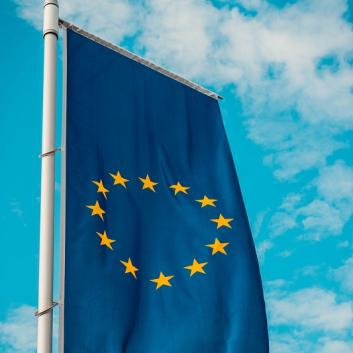Wake up call for businesses

"If business owners were thinking about to keep up with recent trends by undertaking a sustainability journey for the first time, they would be forgiven for getting totally confused with the plethora of acronyms that dominate the subject: CSR; ESG, CDP, GRI."
Says, Alan McDonnell founder of Good Governance Solutions, who works with business leaders on the implementation of the 17 Sustainable Development Goals, launched in 2015 by the United Nations. Alan provides an easy to digest guideline on how a small business could turn these goals into a market advantage.
Entering into the world of sustainability
The topic of sustainability has taken on many forms in recent years. It has ranged from environmental contamination including all kinds of pollution to climate change, carbon emissions and more.
By all credible accounts, we are faced with an uncertain global future that is already becoming a reality with extreme weathers events, mass wildlife extinctions and the breakdown of the biodiversity universe.
Only now these matters are not only the concerns of environmentalists but business leaders.
The business world has long had an understanding of its social role and Corporate Social Responsibility (CSR) has become a building block of most corporate strategies across all commercial sectors.
In more recent times we’ve seen a revolution in the institutional investment community with the emergence of Sustainable Finance with it's Environmental, Social and Governance (ESG) metrics influencing investment decisions on a global scale.

In 2015 all members of the United Nations (UN), including Ireland, signed a pact – Sustainable Development Goals (SDGs) – to adopt 17 goals covering inter-related Economic, Social and Environmental topics. These 17 goals and their related 169 targets are to be achieved by 2030. They don’t replace the earlier acronyms mentioned, they incorporate and accommodate them.
Since its launch, the Sustainable Development Goals (SDGs) have become the only game in town.
They should not be thought of as noble or optional aspirations. Instead, they should be looked on as necessary changes to our collective behaviour on this planet that are vital to our very existence as a species and a game changer for a business who wants to strive in this new economy.
The role of business
All of the 17 goals are binding on each member state that signed up to them but there was a realisation that they could not be achieved without active collaboration with the business and civic communities.
The United Nation Global Compact (UNGC), was established to liaise with business networks, also formed a partnership with the Global Reporting Initiative (GRI) and the World Business Council for Sustainable Development (WBCSD).
This partnership has published a set of guidelines to help businesses prioritise goals and targets relevant to their particular scene while GRI defined the key performance indicators they should use to annually report on their progress up to 2030.
I would say: Immerse yourself in Sustainable Development Goals! Everything you need to know is there.
Leveraging Potential Business Opportunities
According to a report by the Business & Sustainable Development Commission (2017), the SDGs could globally generate US$12 trillion in business savings and revenue across four sectors by 2030: energy; cities; food and agriculture; and, health and well-being.
The report also estimates the creation of 380 million new jobs linked to these four sectors over the next ten years.
The main challenge for businesses is to prioritise the goals relevant to their sector, identify and mitigate its risk impacts while also spot and leverage business opportunities they present.
On the international stage, we see many multinational companies, like Unilever leverage health and well-being opportunities by aligning the SDGs with their strategy, culture and purpose.
Paul Polman, former Unilever CEO explains the rational for this approach by saying that “it’s not about putting purpose ahead of profits, it is purpose that drives profits”.
The opportunities appear to be limited only by one’s imagination and businesses regardless of their size, all over the world are taking actions and transforming ‘business as usual’!
The Global Opportunity Explorer provides the global business community with direct access to the most innovative business solutions and emerging market opportunities to help achieve and understand the Sustainable Development Goals.
This digital platform helps business leaders, entrepreneurs and investors connect with new partners, projects, markets and talents to deliver on the SDGs.
How to get started?
A common mistake many businesses make is to focus purely on SDGs related to environmental issues. This portrays a fundamental misunderstanding of what sustainability means.
At the start, it is well worth the time to glean a better understanding of the Goals and their inter-related economic, social and environmental dimensions.
The practical first step is prioritising the SDGs which requires drilling down to see which of the 169 Targets related to the 17 Goals are relevant and significant to a given business or its sector.
Having identified the KPIs and Targets relevant and significant to the business or sector, the prioritised SDGs will reveal themselves. Quality over quantity might be the best principle here: do not be concerned if they are a low number!
When this ‘penny drops’, it opens up a whole new understanding of what this is all about: adopting and sharing a new set of global values that will govern our economic, social and environmental behaviours to ensure a sustainable world for all of us.
Materiality Analysis
Each business has to go beyond its own analysis of what is significant, also needs to consult with its key stakeholders including, of course, customers. That way you can determine which of your prioritised Goals and Targets influences their decisions.
By marrying the results of both assessments, you will have completed the Materiality Analysis process that addresses your internal and external dimensions allowing you to prioritise with confidence.
Corporate Governance
Corporate governance defines best-practices in how a board should set and oversee the achievement of its organisation’s strategic objectives.
It has become increasingly evident that those practices need to be updated by embedding the SDGs and aligning strategy with them.
Codes of Governance need to be urgently revised to set the SDGs as the future pillars of good governance. Board members should be deeply inducted into sustainability so the tone-at-the-top embeds SDGs into culture and strategy. Unless the board takes such a leading role, any effort is destined to fail. It starts and stops in the boardroom.
Boards across the public, private and non-profit sectors will become exposed to accusations of negligence if they do not embrace relevant Sustainable Development Goals to their sector.
My mission is to help boards avoid such exposure and take the leading role in ensuring the organisation is dedicated to controlling the risks and leveraging the opportunities presented by the SDGs.
It is such a delight to see the young holding businesses and governments to account on the sustainability of their world. It is they who will give your business a future 'licence-to-operate'.
Forming sectorial SDG networks in Ireland
The large corporates in Ireland have embraced this challenge very well but 96% of business falls into the SME (Small and Medium Enterprise) category with very limited time and resources. Engaging in the SDG challenge needs indefinite commitment. Greenwashing can be seen a mile away and does irreparable damage to a company’s reputation.
One of the best ways to crack the SME challenge is to form Sectoral SDG Networks who will share experience and benchmark peer-group progress.
Almost every business is a member of a representative body such as IBEC and ISME. These are the type of organisations who should be forming their members into SDG Networks, setting targets for their sectors and providing them with the tools to report and compare progress.
State bodies and Regulators are also well-positioned to play a vital part and form Sectoral SDG Networks as they preside over sectors, be that transport, food, pharma, agriculture, energy, health etc.
My strongest advice to any SME is to call on your business association and demand they start forming Sectoral SDG Networks.
It might be even easier than it looks, by sharing the blueprint on SDG Sector Roadmaps, published by the World Business Council for Sustainable Development.
Local movements in Ireland
Apart from the business sector, many State bodies are active especially the Department of Communication, Climate Action and the Environment. In 2018 they reported at the UN on Ireland’s progress using national KPIs and formed the National SDG Forum which is facilitating many civil society engagements.
SDGs are now filtering down to our local communities who are embracing their three economic, social and environmental dimensions.
One of my favourite examples of this is the recently emerging Dundrum 2030 Sustainable Community. Their mission is to take practical local initiatives to meet the Sustainable Development Goals in collaboration with all relevant stakeholders.
Globally SDG locomotives are pulling away and the Irish business community need to catch up.
Partnering, networking, sharing and learning are keywords in Agenda 2030.
To find out more about good governance practices please feel free to get in touch with Good Governance Solutions.


















